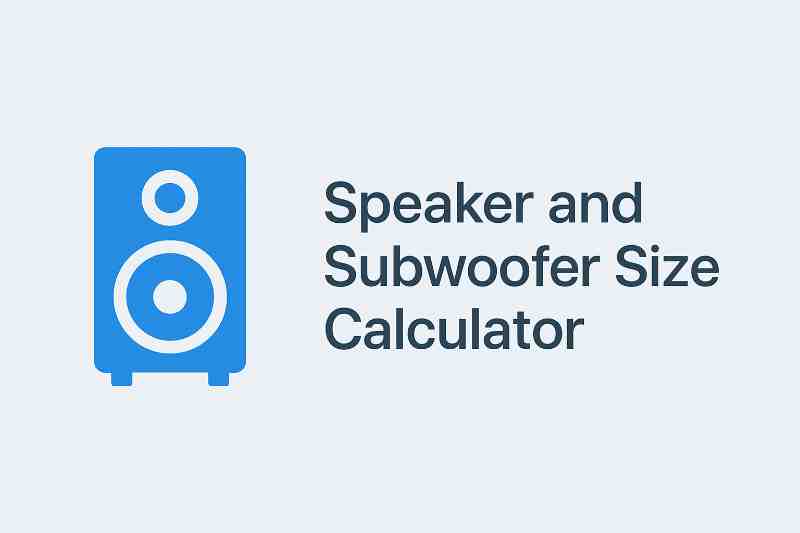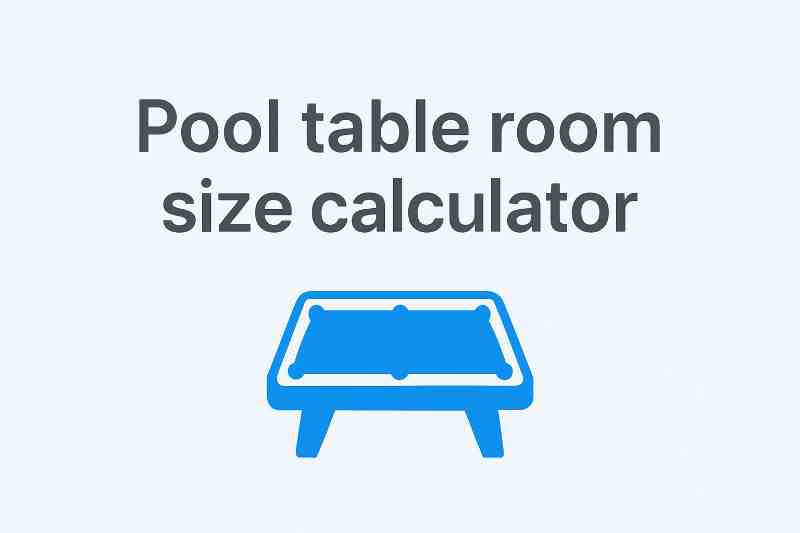Projector Screen Size Calculator
Results
Screen Width: —
Ensures the screen fits the room and provides an immersive experience.Screen Height: —
Maintains proper aspect ratio for optimal viewing.Screen Diagonal: —
The diagonal size of the screen for easy reference.Recommendations: —
For a balanced and immersive viewing experience.Choosing the right projector screen size is essential for a great viewing experience—whether you're building a home theater, setting up a conference room, or using a projector in the classroom. Our Projector Screen Size Calculator helps you determine the perfect screen dimensions based on your room size, viewing distance, and projector resolution.
Use this tool to match your screen size with your projector’s throw ratio, aspect ratio (16:9, 4:3, 21:9), and pixel resolution for crisp visuals and comfortable viewing angles.
How to Calculate the Right Projector Screen Size
The best screen size depends on three main factors:
- Viewing Distance: How far you’ll sit from the screen
- Throw Distance: How far the projector is from the screen
- Resolution: The pixel output (1080p, 4K, etc.) of your projector
General Formula:
Ideal Screen Diagonal (in inches) = Viewing Distance (inches) ÷ 1.6
For example, if your sofa is 120 inches (10 feet) from the wall, your ideal screen diagonal is about 75 inches.
Projector Screen Size Calculator Based on Room Size
If you have limited space or want to make sure your screen fits your wall, measure the wall’s width and height. Consider leaving at least 12 inches of clearance from ceiling and floor.
Common room sizes and their ideal screen diagonals:
| Room Size (ft) | Viewing Distance | Recommended Screen Size (diagonal) |
|---|---|---|
| 10' x 12' | 8–10 ft | 75–100" |
| 12' x 15' | 10–12 ft | 100–120" |
| 15' x 20' | 12–14 ft | 120–135" |
Projector Screen Size Chart (16:9 Format)
| Diagonal | Width | Height | Minimum Viewing Distance |
|---|---|---|---|
| 80" | 70" | 39" | 6.5 ft |
| 100" | 87" | 49" | 8 ft |
| 120" | 105" | 59" | 10 ft |
| 135" | 118" | 66" | 11.5 ft |
| 150" | 131" | 74" | 13 ft |
Projector Screen Size in Pixels
Pixel size matters when you're projecting HD, Full HD, or 4K content. Here's how common resolutions match screen sizes:
- HD (720p): 1280 x 720 pixels – best up to 80” screen
- Full HD (1080p): 1920 x 1080 – ideal up to 120”
- 4K UHD: 3840 x 2160 – best for 100”+ screens with high clarity
For pixel-perfect visuals, choose a screen that doesn’t overstretch the resolution—especially for data-heavy content like spreadsheets or games.
What Is the Size of a Projector Screen?
Projector screens are measured diagonally, just like TVs. Standard home theater screens range from 80 to 150 inches. Commercial setups may go larger. The width and height depend on the screen’s aspect ratio:
- 16:9 (widescreen): Most common for movies and games
- 4:3: Used for presentations and classrooms
- 21:9: Ultra-wide for cinema-style setups
What Is the Best Pixel Size for a Projector?
It depends on your screen size and how far you’ll sit:
- For 80–100” screens: 1080p is more than enough for most home uses
- For 120” or larger: Go for 4K to maintain sharpness
- Close seating: Higher pixel density (like 4K) reduces visible pixelation
Other Factors to Consider
- Projector throw ratio: Determines how far back the projector needs to be
- Room lighting: Brighter rooms need higher lumens and may benefit from smaller screens
- Screen material: Matte white is standard, but ALR (Ambient Light Rejecting) screens work better in non-dark rooms
- Mounting height: Ensure screen is at eye level when seated—usually 24–36" off the floor
FAQs About Projector Screen Sizes
What’s the most popular projector screen size?
100–120 inches (diagonal) is the most popular range for home theaters and living rooms.
How far should you sit from a 120-inch screen?
Ideally 10 to 13 feet away. This distance gives you full immersion without eye strain.
Can I use a blank wall instead of a screen?
Yes, but screen surfaces enhance contrast and clarity—especially with 4K or in well-lit rooms. For best results, use a proper screen or paint the wall with projector screen paint.
Is a bigger screen always better?
Not always. The best screen size depends on viewing distance, resolution, and room dimensions. Too large can cause eye fatigue or pixelation.
Final Thoughts
Getting your projector screen size right is key to enjoying movies, presentations, and games without discomfort or distortion. Use our Projector Screen Size Calculator to match your room dimensions, seating distance, and resolution to the perfect screen size. Whether you’re planning a cozy setup or a full home theater, the right screen makes all the difference.



